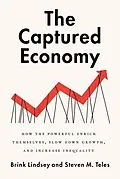For years, America has been plagued by slow economic growth and increasing inequality. In The Captured Economy, Brink Lindsey and Steven M. Teles identify a common factor behind these twin ills: breakdowns in democratic governance that allow wealthy special interests to capture the policymaking process for their own benefit. They document the proliferation of regressive regulations that redistribute wealth and income up the economic scale while stifling entrepreneurship and innovation. They also detail the most important cases of regulatory barriers that have worked to shield the powerful from the rigors of competition, thereby inflating their incomes: subsidies for the financial sector's excessive risk taking, overprotection of copyrights and patents, favoritism toward incumbent businesses through occupational licensing schemes, and the NIMBY-led escalation of land use controls that drive up rents for everyone else. An original and counterintuitive interpretation of the forces driving inequality and stagnation, The Captured Economy will be necessary reading for anyone concerned about America's mounting economic problems and how to improve the social tensions they are sparking.
Autorentext
Brink Lindsey is Vice Policy President and Director of the Open Society Project at the Niskanen Center. He is the author of, most recently, The Age of Abundance and Human Capitalism. Steven M. Teles is Professor of Political Science at Johns Hopkins University and Senior Fellow at the Nikansen Center. He is the author of, most recently, The Rise of the Conservative Legal Movement and Prison Break: Why Conservatives Turned Against Mass Incarceration.
Inhalt
Chapter One: The Paradox of Stagnation and Exploding Inequality Chapter Two: Why Rents Matter Chapter Three: Finance Chapter Four: Intellectual Property Chapter Five: Occupational Protection Chapter Six: Land Use Chapter Seven: The Macropolitics of Regressive Stagnation Chapter Eight: The Politics of Breaking Regressive Stagnation Chapter Nine: Conclusion
